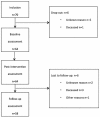Long-Term Changes of Symptoms of Anxiety, Depression, and Fatigue in Cancer Patients 6 Months After the End of Yoga Therapy
- PMID: 30791735
- PMCID: PMC7240880
- DOI: 10.1177/1534735418822096
Long-Term Changes of Symptoms of Anxiety, Depression, and Fatigue in Cancer Patients 6 Months After the End of Yoga Therapy
Abstract
Background: Symptoms of anxiety, depression, and cancer-related fatigue are commonly associated with cancer. Cancer patients increasingly use complementary and alternative treatments, such as yoga, to cope with psychological and physical impairments. In the present article, long-term changes of anxiety, depression, and fatigue in cancer are examined 6 months after a yoga intervention.
Method: We used an observational design based on a randomized controlled study in cancer patients with mixed diagnoses to evaluate long-term changes of symptoms of anxiety, depression, and fatigue 6 months after the end of yoga therapy. We measured anxiety symptoms with the Generalized Anxiety Disorder scale (GAD-7), depressive symptoms with the Patient Health Questionnaire-2 (PHQ-2), and fatigue with the European Organization for Research and Treatment of Cancer Quality of Life Questionnaire-Fatigue Scale (EORTC QLQ-FA13). Yoga therapy was provided in yoga classes of 60 minutes each once a week for 8 weeks in total. The exercises provided contained both body and breathing activities as well as meditation.
Results: A total of 58 patients participated in the study. Six months after the end of yoga therapy, symptoms of anxiety, depression, and fatigue were significantly reduced compared with baseline. However, symptoms of anxiety and fatigue slightly increased during the follow-up period, whereas symptoms of depression remained stable.
Conclusion: Our results are promising and support the integration of yoga interventions in supportive cancer treatment concepts but should be confirmed by randomized controlled trials. Long-term effects of yoga therapy on cancer patients should be the subject of further research.
Keywords: anxiety; cancer; depression; fatigue; oncology; supportive care; yoga.
Conflict of interest statement
Figures





References
-
- Robert-Koch-Institut; die Gesellschaft der epidemiologischen Krebsregister in Deutschland e.V. Krebs in Deutschland 2011/2012. 10 aufl. Berlin, Germany: Robert-Koch-Institut; 2015.
-
- Roth AJ, Massie MJ. Anxiety and its management in advanced cancer. Curr Opin Support Palliat Care. 2007;1:50-56. - PubMed
-
- Roy-Byrne PP, Davidson KW, Kessler RC, et al. Anxiety disorders and comorbid medical illness. Gen Hosp Psychiatry. 2008;30:208-225. - PubMed
-
- Mitchell AJ, Chan M, Bhatti H, et al. Prevalence of depression, anxiety, and adjustment disorder in oncological, haematological, and palliative-care settings: a meta-analysis of 94 interview-based studies. Lancet Oncol. 2011;12:160-174. - PubMed
-
- Mehnert A, Brähler E, Faller H, et al. Four-week prevalence of mental disorders in patients with cancer across major tumor entities. J Clin Oncol. 2014;32:3540-3546. - PubMed
Publication types
MeSH terms
LinkOut - more resources
Full Text Sources
Medical

